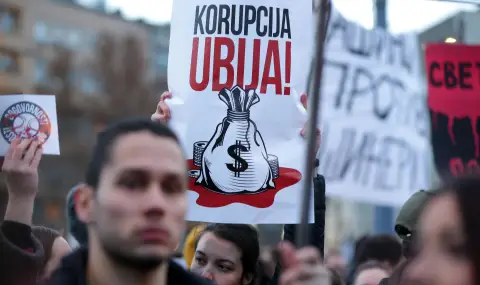More than seven weeks after the fatal collapse of a train station canopy in Serbia, tens of thousands of people have protested again in the capital Belgrade, demanding that those responsible be punished. According to police, there were 29,000 protesters, but the "Archive of Rallies" organization, which counts and evaluates demonstrations, reports that 100,000 people gathered in the Serbian capital.
The protest was directed against President Aleksandar Vucic, Prime Minister Milos Vucevic and the mayor of Novi Sad, where the incident took place. The rally, organized by students on Slavija Square, a normally bustling roundabout, began with a 15-minute silence in memory of the victims of the incident. Banners read slogans such as "Blood is on your hands" and "Children's revolution".
The rally was one of the largest in this wave of protests, media reported. Among them were farmers, famous actors and people from other parts of the country. Smaller rallies were also held in other cities in Serbia.
President Vucic will not give up
In a show of confidence, the Serbian president opened a section of a newly built highway in central Serbia on Sunday. Vucic said he would not give in to opposition demands for a transitional government and accused his opponents of using students to try to seize power. "We will defeat them again", Vucic said. "They don't know what to do except use someone else's children."
In an apparent attempt to dispel the student-led protests, Vucic has been promoting what he says are "affordable" loans for young people to buy homes, as well as attracting tens of thousands of doctors and other qualified people who have left the Balkan country in recent years in search of a better life in the West.
In recent days, however, another scandal has rocked Serbia - a report by "Amnesty International" accused the country's authorities of installing spyware on the mobile devices of journalists, activists and critics of the government in order to monitor them.
Critics accuse authorities of negligence and corruption
On November 1, the roof of the newly renovated central railway station in the northern Serbian city of Novi Sad collapsed. Fifteen people died and dozens were injured. The station renovation was part of a new railway line from Belgrade to Budapest in Hungary, which was being built by Chinese companies.
After the incident, the prosecutor's office in Novi Sad opened an investigation and ordered provisional arrests, but did not name any suspects. Critics of President Vučić's government and experts suggest that the roof collapse was due to negligence and corruption. After large demonstrations in Novi Sad and Belgrade, Serbian students took action. They occupied 50 faculties in four of the largest universities in the country. Later, they were joined by high school students who occupied the schools. They continue to this day.
Mina Kirkova
